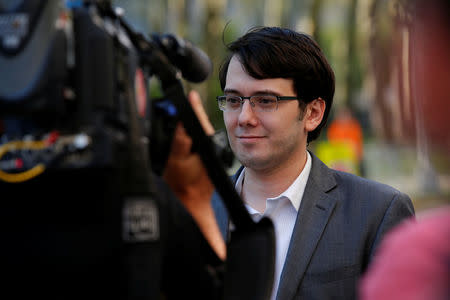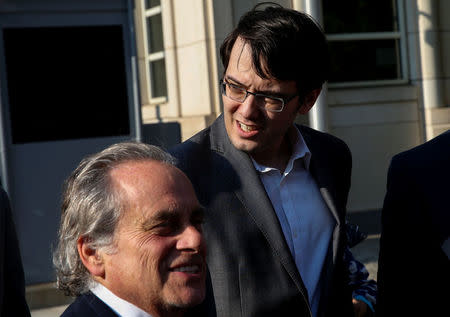Jury in Martin Shkreli trial seeks clarity on 'fraudulent intent'
By Brendan Pierson
NEW YORK (Reuters) - Jurors in the trial of former drug company executive Martin Shkreli on Tuesday asked a judge to clarify the definition of "fraudulent intent," a key element of the case, in their first significant note since they began deliberating Monday morning.
The jurors, who are weighing charges of securities fraud and conspiracy against Shkreli in U.S. District Court in Brooklyn, ended their second day of deliberations without reaching a verdict. They were expected to return on Wednesday morning.
Before going on trial, Shkreli, 34, was best known for raising the price of anti-infection drug Daraprim by 5,000 percent in 2015 as chief executive of Turing Pharmaceuticals. That increase sparked outrage from U.S. lawmakers and patients and earned Shkreli the nickname "Pharma bro."
The criminal case stems from Shkreli's career before Turing, when he managed hedge funds MSMB Capital and MSMB Healthcare and drug company Retrophin Inc. Prosecutors have said that between 2009 and 2014, Shkreli lied to MSMB investors, lost their money and paid them back with stock and cash taken from Retrophin without the approval of the company's directors.
In their note, sent in the early afternoon, jurors asked U.S. District Judge Kiyo Matsumoto for definitions of "assets under management" and "fraudulent intent."
One of the accusations against Shkreli is that he greatly overstated the assets under management by the MSMB funds to lure investors.
Using language agreed to by prosecutors and Shkreli's lawyers, U.S. District Judge Kiyo Matsumoto told the jurors that what Shkreli meant when he used the phrase "assets under management" was up to them to decide.
For "fraudulent intent," the judge directed jurors to refer to relevant parts of the instructions they were given when they began deliberating. The jurors must find that Shkreli acted with fraudulent intent to convict him of any of the charges.
Shkreli's lawyer, Benjamin Brafman, has urged jurors to see his client not as a fraudster but as an eccentric genius determined to build a drug company that would cure rare diseases. He said that while Shkreli's statements to investors were not always entirely accurate, he made them in good faith.
Brafman also emphasized that none of Shkreli's investors lost money, a rarity in a securities fraud case.
Shkreli was ousted as chief executive officer of Retrophin in 2014 before going on to found Turing.
(Reporting By Brendan Pierson in New York; Editing by Jonathan Oatis)



